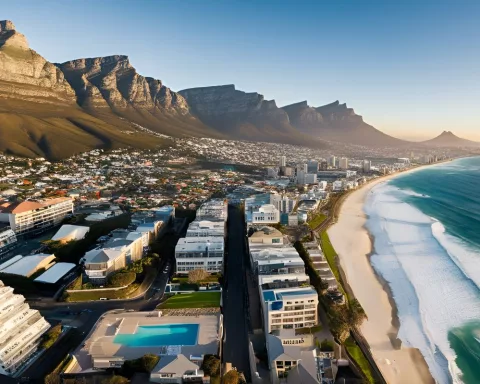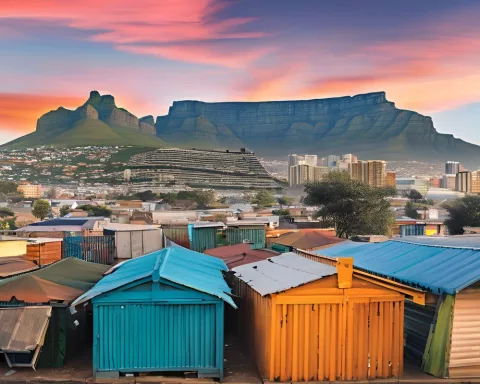The Western Cape High Court has approved the eviction of illegal settlements in Cape Town’s CBD, including Buitengracht Street and Foregate Square. The City plans to invest over R220 million to expand and manage its Safe Space transitional shelters beyond the existing 770 beds across the CBD, Bellville, and Durbanville facilities as part of its continuous battle against homelessness. Safe Spaces provide transitional accommodation and social support initiatives to help individuals transition off the streets.
Crucial Eviction Mandate Approved for Illicit Settlements in Cape Town
The Western Cape High Court has approved the eviction of numerous illicit settlements in Cape Town’s CBD, including Buitengracht Street, Foregate Square, and FW De Klerk Boulevard, among others. The eviction process was delayed by a Johannesburg-based NGO but resumed in October 2023, with the final ruling announced in June 2024. The City plans to invest over R220 million in the next three years to expand and manage its Safe Space transitional shelters beyond the existing 770 beds across the CBD, Bellville, and Durbanville facilities.
The Western Cape High Court has reached a crucial decision, supporting the eviction of numerous illicit settlements scattered across Cape Town’s Central Business District (CBD). This verdict follows extensive legal proceedings initiated by issuing eviction warnings in February 2023. The process was halted due to last-minute resistance from a Johannesburg-based NGO, causing a delay until October 2023. The final ruling came to light on 18 June 2024.
The Areas Affected and Future Implications
The areas targeted for eviction include several illegal occupation hotspots in the city such as Buitengracht Street, FW De Klerk Boulevard, Foregate Square, among others. The court’s decision further institutes a permanent injunction against any future unlawful occupations in these areas or any other public spaces owned by the city.
Throughout the ongoing legal hurdles, the City’s Social Development officers have consistently provided social assistance to the unauthorized inhabitants of the city’s public spaces. They have made efforts to extend their help by offering dignified transitional accommodation at NGO-run night shelters and City-owned Safe Spaces.
Safe Spaces are specially crafted facilities designed to reintegrate people into society or reconnect them with their families. They provide transitional accommodation along with social support initiatives to help individuals smoothly transition off the streets. These facilities also provide opportunities for personal growth planning, employment, mental health, and treatment for medical and substance abuse.
The City’s Response and Future Plans
“The City welcomes this order which will aid in the restoration of public spaces in Cape Town’s CBD for community use. The court has acknowledged City Safe Spaces as dignified transitional shelters, and the offer of space in these facilities is still open to those who are yet to accept,” expressed Mayor, Geordin Hill-Lewis.
In recent months, the High Court has approved two similar eviction orders for central Cape Town. These eviction decrees were executed by the Sheriff against illegal occupants at Green Point Tennis Courts and around the Nelson Mandela Boulevard intersection with Hertzog Boulevard, Old Marine Drive, and Christiaan Barnard Bridge.
Furthermore, the City has its eyes set on an upcoming eviction request for the area surrounding the Castle of Good Hope, which falls under the jurisdiction of the national Department of Public Works.
As part of its continuous battle against homelessness, the City plans to invest over R220 million in the upcoming three years to expand and manage its Safe Space transitional shelters beyond the existing 770 beds across the CBD, Bellville, and Durbanville facilities.
The Expansion of Safe Spaces and Their Impact
Currently, two Safe Spaces are operational at Culemborg in the east CBD, providing 510 shelter beds across both facilities. An additional 300-bed Safe Space at Green Point is expected to open in the near future.
The City recently supported a significant expansion of the CBD’s Haven Night Shelter, increasing its capacity from 96 to 156 beds through a R500 000 investment. During the previous winter, the City enabled several NGOs to supplement an extra 300 temporary bed spaces to cater to the additional shelter demand.
The City also manages the Matrix substance abuse treatment program, boasting an 83% success rate for participants, addressing a major cause of homelessness.
In the year leading up to June 2023, the City has helped nearly 3,500 individuals with shelter placement or referrals to various social services. This includes more than 2,200 shelter placements, over 100 family reunifications and reintegrations, over 1,100 referrals to social services, and more than 880 short-term contractual job opportunities via the Expanded Public Works Programme.
The City’s Safe Space model includes features like dignified shelters, comfort and ablutions, two meals per day, access to an on-site social worker, personal development planning, and various social services including ID Book and social grant assistance, family reunification services, access to substance and alcohol abuse treatment, skills training, job-finding assistance, and access to EPWP work placement.
What areas are affected by the eviction mandate in Cape Town?
Several illegal occupation hotspots in Cape Town’s Central Business District (CBD) are affected by the eviction mandate, including Buitengracht Street, FW De Klerk Boulevard, Foregate Square, and others.
What are Safe Spaces in Cape Town?
Safe Spaces are transitional shelters designed to provide temporary accommodation and social support initiatives to help individuals transition off the streets. They offer opportunities for personal growth planning, employment, mental health, and treatment for medical and substance abuse.
What is the City’s response to the eviction mandate?
The City welcomes the eviction mandate and plans to invest over R220 million in the upcoming three years to expand and manage Safe Space transitional shelters beyond the existing 770 beds across the CBD, Bellville, and Durbanville facilities.
How does the City manage homelessness in Cape Town?
The City provides social assistance to the unauthorized inhabitants of the city’s public spaces through its Social Development officers. It offers dignified transitional accommodation at NGO-run night shelters and City-owned Safe Spaces. The City also manages the Matrix substance abuse treatment program and provides referrals to various social services.
What is the impact of Safe Spaces in Cape Town?
Safe Spaces provide transitional accommodation and social support initiatives, including access to personal development planning, employment, mental health, and treatment for medical and substance abuse. The City’s Safe Space model includes features like dignified shelters, comfort and ablutions, two meals per day, access to an on-site social worker, and various social services.
What are the future plans of the City for homelessness in Cape Town?
The City plans to invest over R220 million in the upcoming three years to expand and manage its Safe Space transitional shelters beyond the existing 770 beds across the CBD, Bellville, and Durbanville facilities. The City also supports the expansion of the Haven Night Shelter and provides referrals to various social services.












